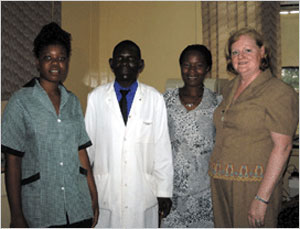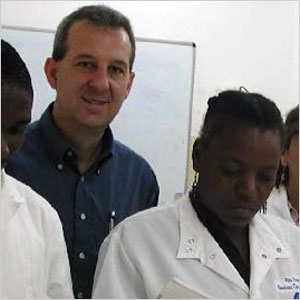


|
ASM LabCap Stories from the Field Archive: The LabCap Experience
"My Most Rewarding Experience as a Clinical Scientist"For some ASM members, their LabCap work has been their first consulting done outside their home country. For others, the LabCap activity has been just one of many foreign assignments. Regardless of their level of international experience, nearly all the LabCap participants have felt a strong sense of satisfaction with the work they have done through the LabCap program. "It's probably the most rewarding experience I've had as a clinical scientist," Frances Ingersoll says of her two three-week assignments, in 2007 and 2008, in Zambia, in East Africa. Ingersoll, who is with Our Lady of Fatima Hospital, in North Providence, Rhode Island, had spent vacations in Europe and on ecotourism trips to Central America, but the Zambia assignments were her first work as an international consultant. She had received various emails from ASM about possible LabCap assignments, but the announcement for Zambia seemed an ideal match. "It connected with various things that I've done as a professional. I started as a technologist, I taught for many years, and now I'm the supervisor of a microbiology program." Ingersoll appreciated the pre-trip information that ASM staff members provided her and the ongoing, day-to-day support in Zambia from the local representative of the U.S. Centers for Disease Control and Prevention, the agency that supports the LabCap program through a four-year cooperative agreement with ASM. Adjusting to the local culture also went smoothly. Language was not a problem since Zambia is an English-speaking country. As is typical for LabCap assignments, Ingersoll stayed in first-class hotels in the two places where she worked, in the capital of Lusaka and in the city of Livingstone, which is near the large Victoria Falls waterfall. Vlademir Cantarelli is another ASM member for whom his LabCap experience was his first consulting assignment outside his home country. Cantarelli spent ten days in the East African country of Mozambique in November 2007 and six weeks there at the beginning of 2008. Cantarelli works for the Weinmann Laboratório company in the city of Porto Alegre, Brazil, and also teaches at a nearby university. At age 44, Cantarelli is younger than the typical LabCap consultant. However, as with Ingersoll, his combination of laboratory skills and teaching experience is common for many of the LabCap consultants. Another asset was his language abilities: both Brazil and Mozambique are Portuguese-speaking countries. The majority of LabCap participants have had previous international consulting assignments. For example, David Coleman, who is with the University of London, had worked since the 1970s with international visitors who had come to the United Kingdom, and he has been making consulting trips to other countries for the past seven years. Coleman has made two trips for LabCap to the West African country of Nigeria. In their LabCap assignments in Africa, Ingersoll, Cantarelli, and Coleman have all seen sharp contrasts with conditions in their home-country labs. "In the U.S.," comments Ingersoll, "we're used to the latest technology, and having the reagents you need right at hand or available soon after you order them. In Africa, you can put in your order [for reagents] and you may have to wait. You have to improvise. You have to find another way to accomplish the same goal." That kind of flexibility (along with patience) is essential to being successful in a LabCap assignment, according to the three LabCap consultants. 'You have to be prepared to see microbiology at a much earlier stage," says Ingersoll. "We expect to make tremendous changes, but it's really little ones, one by one over time."
Written by Bill Black |
